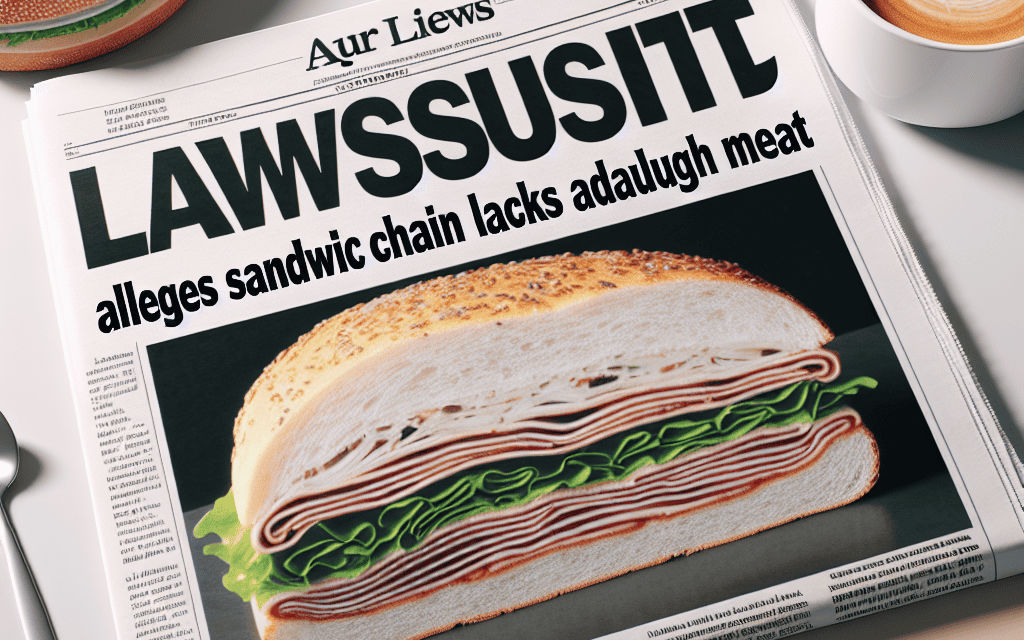“Where’s the Beef? Subway Faces Legal Heat Over Meat Defeat!”
Introduction
A recent lawsuit has been filed against Subway, the popular fast-food chain, alleging that its sandwiches contain insufficient amounts of meat compared to what is advertised. The legal action claims that Subway has been misleading customers by overstating the quantity of meat in its products, thereby violating consumer protection laws. This lawsuit brings attention to the broader issue of transparency in food labeling and advertising, raising questions about the accuracy of marketing practices in the fast-food industry. As the case unfolds, it could have significant implications for Subway and potentially lead to changes in how food content is represented to consumers.
Legal Implications Of Misleading Food Advertising
In recent years, the food industry has faced increasing scrutiny over the accuracy of its advertising claims, with consumers becoming more vigilant about the authenticity of the products they purchase. A notable example of this trend is the lawsuit filed against Subway, the globally recognized sandwich chain, alleging that its sandwiches contain less meat than advertised. This legal action raises significant questions about the implications of misleading food advertising and the responsibilities of companies to provide truthful information to consumers.
The lawsuit, initiated by a group of consumers, claims that Subway’s marketing materials and in-store displays promise a certain quantity of meat in their sandwiches, which, according to the plaintiffs, is not delivered in reality. The plaintiffs argue that this discrepancy constitutes false advertising, a violation of consumer protection laws designed to ensure that companies do not deceive customers about the nature or quality of their products. As the case unfolds, it highlights the broader legal implications for food companies that may engage in similar practices.
One of the central issues in this lawsuit is the definition of what constitutes adequate meat content in a sandwich. The plaintiffs assert that Subway’s representations create specific expectations about the amount of meat that should be present, and when these expectations are not met, it results in consumer deception. This raises the question of how food companies should quantify and communicate the contents of their products to avoid misleading consumers. The outcome of this case could set a precedent for how such claims are evaluated in the future, potentially influencing industry standards and regulatory guidelines.
Moreover, the lawsuit underscores the importance of transparency in food advertising. As consumers become more health-conscious and discerning about their food choices, they demand greater clarity and honesty from food manufacturers. This case serves as a reminder to companies that misleading advertising not only risks legal repercussions but also damages consumer trust and brand reputation. In an era where social media can amplify consumer grievances rapidly, maintaining transparency is crucial for sustaining customer loyalty and avoiding public backlash.
Furthermore, the legal battle against Subway may prompt regulatory bodies to re-examine existing guidelines on food advertising. If the court rules in favor of the plaintiffs, it could lead to stricter enforcement of advertising standards and more rigorous oversight of food labeling practices. This potential shift in regulatory focus would aim to protect consumers from deceptive marketing tactics and ensure that they receive accurate information about the products they purchase.
In addition to regulatory implications, this lawsuit also highlights the role of consumer advocacy in holding companies accountable. The plaintiffs’ willingness to challenge a major corporation like Subway demonstrates the power of collective action in addressing perceived injustices in the marketplace. It serves as an example of how consumers can leverage legal avenues to demand accountability and drive change within the industry.
In conclusion, the lawsuit alleging that Subway sandwiches lack adequate meat content brings to light critical issues surrounding misleading food advertising. It emphasizes the need for transparency, accurate representation, and adherence to consumer protection laws. As the case progresses, it may influence future legal standards and regulatory practices, ultimately shaping the way food companies communicate with their customers. This legal challenge not only seeks to address specific grievances but also contributes to the broader discourse on consumer rights and corporate responsibility in the food industry.
Consumer Rights In The Food Industry
In recent years, consumer rights within the food industry have become a focal point of public discourse, as individuals increasingly demand transparency and accountability from food providers. A notable case that has captured widespread attention involves a lawsuit against Subway, the globally recognized sandwich chain, alleging that its sandwiches contain insufficient amounts of meat. This legal action underscores the growing consumer insistence on product integrity and the broader implications for the food industry.
The lawsuit, filed in a U.S. district court, claims that Subway has been misleading customers by advertising sandwiches that purportedly contain more meat than they actually do. Plaintiffs argue that the discrepancy between the advertised and actual meat content constitutes false advertising and a breach of consumer trust. This case is not merely about the quantity of meat in a sandwich; it raises significant questions about the ethical obligations of food companies to deliver on their promises and the legal frameworks that protect consumers from deceptive practices.
As the case unfolds, it highlights the critical role of accurate labeling and marketing in the food industry. Consumers rely heavily on product descriptions to make informed purchasing decisions, and any deviation from these descriptions can lead to dissatisfaction and a sense of betrayal. The allegations against Subway suggest that the company may have prioritized cost-cutting measures over customer satisfaction, a strategy that could backfire if the court rules in favor of the plaintiffs. This situation serves as a cautionary tale for other food companies, emphasizing the importance of maintaining transparency and honesty in all consumer interactions.
Moreover, this lawsuit reflects a broader trend of increased consumer activism, where individuals are more willing to challenge large corporations over perceived injustices. The rise of social media and digital platforms has empowered consumers to voice their grievances and mobilize support for their causes, thereby exerting pressure on companies to adhere to ethical standards. In this context, the Subway case could set a precedent for future legal actions, encouraging consumers to hold food providers accountable for their claims.
In addition to the legal ramifications, this case also has potential economic implications for Subway. If the court finds the company guilty of false advertising, it could face substantial financial penalties and a loss of consumer confidence. Such outcomes could adversely affect Subway’s brand reputation and market share, as customers may choose to patronize competitors perceived as more trustworthy. Consequently, this lawsuit serves as a reminder to all food industry players of the critical importance of building and maintaining consumer trust through honest and transparent business practices.
Furthermore, the case against Subway may prompt regulatory bodies to scrutinize food labeling and advertising practices more closely. Increased regulatory oversight could lead to stricter guidelines and standards, ensuring that companies provide accurate information about their products. This development would benefit consumers by enhancing their ability to make informed choices and fostering a more equitable marketplace.
In conclusion, the lawsuit alleging that Subway sandwiches lack adequate meat is emblematic of the evolving landscape of consumer rights in the food industry. It underscores the necessity for companies to prioritize transparency and integrity in their operations, as failure to do so can result in legal challenges and reputational damage. As consumers continue to demand accountability, the food industry must adapt to these expectations, ensuring that product claims align with reality and that consumer trust is upheld.
The Role Of Class Action Lawsuits In Consumer Protection
In recent years, class action lawsuits have emerged as a powerful tool for consumer protection, providing a mechanism for individuals to collectively address grievances against corporations. A notable example of this is the lawsuit filed against Subway, the popular sandwich chain, which alleges that its sandwiches contain insufficient amounts of meat. This case highlights the critical role that class action lawsuits play in holding companies accountable and ensuring that consumer rights are upheld.
Class action lawsuits serve as a means for consumers to band together when they have been similarly affected by a company’s practices. In the case of Subway, the plaintiffs argue that the company has misled customers by advertising sandwiches with more meat than they actually contain. This alleged discrepancy between marketing and reality raises questions about transparency and honesty in advertising, which are fundamental to consumer trust. By allowing a group of consumers to file a lawsuit collectively, the legal system provides a more efficient and effective way to address widespread issues than if each individual were to pursue separate legal action.
Moreover, class action lawsuits can act as a deterrent against corporate misconduct. When companies face the prospect of significant financial penalties and reputational damage, they may be more inclined to adhere to ethical business practices. In the Subway case, the potential for a class action lawsuit to result in substantial damages could encourage the company to reassess its advertising strategies and product offerings. This, in turn, could lead to more accurate representations of products across the industry, benefiting consumers at large.
Furthermore, these lawsuits often bring to light issues that might otherwise remain hidden from public scrutiny. The Subway lawsuit, for instance, has sparked a broader conversation about the quality and authenticity of fast food offerings. As consumers become more aware of the potential discrepancies between advertised and actual product content, they may demand greater transparency and accountability from food companies. This increased awareness can drive industry-wide changes, as companies strive to meet evolving consumer expectations.
In addition to promoting corporate accountability, class action lawsuits can also provide compensation to affected consumers. While individual claims might result in negligible financial recovery, a class action can aggregate these claims into a substantial sum, offering meaningful restitution to those who have been wronged. In the Subway case, if the plaintiffs are successful, affected consumers could receive compensation for the alleged misrepresentation of the sandwich contents. This financial redress not only benefits the individuals involved but also reinforces the principle that companies should be held responsible for their actions.
However, it is important to recognize that class action lawsuits are not without their challenges. They can be complex and time-consuming, often requiring extensive legal resources to navigate. Additionally, there is the potential for settlements that primarily benefit attorneys rather than the affected consumers. Despite these challenges, the benefits of class action lawsuits in promoting consumer protection and corporate accountability are significant.
In conclusion, the lawsuit against Subway alleging inadequate meat in its sandwiches underscores the vital role that class action lawsuits play in consumer protection. By enabling collective action, these lawsuits provide a mechanism for addressing widespread grievances, deterring corporate misconduct, and promoting transparency. As consumers continue to demand accountability from companies, class action lawsuits will remain an essential tool in the ongoing effort to protect consumer rights and ensure fair business practices.
Analyzing The Impact Of Food Labeling Regulations

In recent years, the food industry has faced increasing scrutiny over the accuracy of its labeling practices, with consumers demanding greater transparency and accountability. A recent lawsuit against Subway, a global fast-food chain, has brought this issue to the forefront, alleging that the company’s sandwiches contain less meat than advertised. This case highlights the broader implications of food labeling regulations and their impact on consumer trust and industry practices.
The lawsuit claims that Subway’s sandwiches, which are marketed as containing a specific amount of meat, fall short of these promises. This discrepancy raises questions about the accuracy of food labeling and the regulatory frameworks that govern these practices. Food labeling regulations are designed to ensure that consumers receive accurate information about the products they purchase, enabling them to make informed choices. However, when companies fail to adhere to these standards, it undermines consumer confidence and can lead to legal challenges.
The Subway case is not an isolated incident; it reflects a growing trend of consumers and advocacy groups holding food companies accountable for misleading claims. This trend underscores the importance of robust food labeling regulations and the need for effective enforcement mechanisms. Regulatory bodies, such as the Food and Drug Administration (FDA) in the United States, play a crucial role in setting and enforcing these standards. However, the complexity of the food supply chain and the diversity of products available in the market can make regulation challenging.
Moreover, the Subway lawsuit highlights the potential consequences for companies that fail to comply with labeling regulations. Legal actions can result in significant financial penalties, damage to brand reputation, and loss of consumer trust. For Subway, a company that has built its brand on the promise of fresh and healthy ingredients, the allegations of inadequate meat content could have far-reaching implications. It serves as a reminder to other companies in the food industry of the importance of maintaining transparency and accuracy in their labeling practices.
In addition to regulatory compliance, the case emphasizes the role of consumer advocacy in shaping industry standards. As consumers become more informed and vocal about their expectations, companies are increasingly pressured to prioritize transparency and honesty in their marketing and labeling practices. This shift is evident in the growing demand for clear and accurate information about product ingredients, sourcing, and nutritional content.
Furthermore, the Subway lawsuit may prompt a reevaluation of current food labeling regulations and their effectiveness in protecting consumer interests. Policymakers may consider revising existing standards to address emerging challenges and ensure that regulations keep pace with industry developments. This could involve stricter enforcement measures, increased penalties for non-compliance, and enhanced consumer education initiatives.
In conclusion, the lawsuit against Subway for allegedly inadequate meat content in its sandwiches serves as a critical reminder of the importance of accurate food labeling and the regulatory frameworks that support it. As consumers continue to demand greater transparency and accountability from the food industry, companies must prioritize compliance with labeling regulations to maintain consumer trust and avoid legal repercussions. This case also highlights the need for ongoing evaluation and adaptation of regulatory standards to address the evolving landscape of the food industry, ensuring that consumer interests remain protected.
The Importance Of Transparency In Fast Food Chains
In recent years, the fast food industry has faced increasing scrutiny from consumers and regulatory bodies alike, with transparency becoming a pivotal concern. A recent lawsuit against Subway, one of the world’s largest fast-food chains, underscores the importance of transparency in maintaining consumer trust and brand integrity. The lawsuit alleges that Subway’s sandwiches contain inadequate amounts of meat, raising questions about the accuracy of their advertising and the quality of their products. This legal challenge highlights the broader issue of transparency in the fast food industry, which is essential for ensuring that consumers are fully informed about the products they purchase.
Transparency in fast food chains is crucial for several reasons. Firstly, it fosters trust between the company and its customers. When consumers feel confident that they are receiving exactly what they are promised, they are more likely to remain loyal to the brand. Conversely, when discrepancies arise, such as the alleged lack of adequate meat in Subway sandwiches, it can lead to a breakdown in trust, prompting customers to seek alternatives. This erosion of trust can have significant financial implications for the company, as it may result in decreased sales and a tarnished reputation.
Moreover, transparency is vital for ensuring that consumers can make informed choices about their dietary intake. In an era where health consciousness is on the rise, many individuals are paying closer attention to the nutritional content of their meals. Fast food chains, therefore, have a responsibility to provide accurate information about their products, including portion sizes and ingredient lists. The allegations against Subway suggest that there may be a gap between the company’s marketing claims and the actual content of their sandwiches, which could mislead consumers who rely on this information to make dietary decisions.
In addition to fostering trust and enabling informed choices, transparency also plays a critical role in regulatory compliance. Fast food chains are subject to various regulations that govern food safety, labeling, and advertising practices. By maintaining transparency, companies can ensure that they are adhering to these regulations, thereby avoiding legal challenges and potential penalties. The lawsuit against Subway serves as a reminder of the legal risks associated with a lack of transparency, as it brings into question whether the company has complied with relevant advertising standards.
Furthermore, transparency can drive innovation and improvement within the fast food industry. When companies are open about their practices and products, they are more likely to receive valuable feedback from consumers, which can be used to enhance their offerings. This openness can lead to the development of new products that better meet consumer needs and preferences, ultimately benefiting both the company and its customers.
In conclusion, the lawsuit alleging that Subway sandwiches lack adequate meat underscores the critical importance of transparency in the fast food industry. By fostering trust, enabling informed consumer choices, ensuring regulatory compliance, and driving innovation, transparency serves as a cornerstone for the success and sustainability of fast food chains. As consumers continue to demand greater accountability from the companies they patronize, it is imperative for fast food chains to prioritize transparency in all aspects of their operations. This commitment not only safeguards their reputation but also contributes to a more informed and satisfied customer base.
How Lawsuits Influence Corporate Accountability
In recent years, the food industry has faced increasing scrutiny from consumers and regulatory bodies alike, with lawsuits emerging as a significant tool for holding corporations accountable. A notable example is the recent lawsuit alleging that Subway sandwiches contain inadequate amounts of meat, which has sparked widespread discussion about corporate responsibility and transparency in the food sector. This legal action underscores the growing demand for accountability and the role of litigation in shaping corporate practices.
The lawsuit against Subway, filed by a group of consumers, claims that the company has been misleading customers by advertising sandwiches with more meat than they actually contain. This allegation, if proven true, could have significant implications for Subway, both financially and reputationally. The plaintiffs argue that the discrepancy between advertised and actual meat content constitutes false advertising, a serious charge that could lead to substantial penalties and necessitate changes in Subway’s marketing and product formulation strategies.
As this case unfolds, it highlights the broader issue of how lawsuits can serve as a catalyst for corporate accountability. Legal actions like this one compel companies to re-evaluate their practices and ensure that their products meet the expectations set by their marketing campaigns. Moreover, these lawsuits often bring to light issues that might otherwise remain hidden from public view, prompting companies to adopt more transparent and honest business practices.
Furthermore, the Subway lawsuit is part of a larger trend where consumers are increasingly empowered to challenge corporate giants. With the rise of social media and digital platforms, consumers have more avenues to voice their concerns and mobilize support for legal actions. This shift in consumer behavior has made it more difficult for companies to ignore or dismiss allegations of misconduct, as public opinion can quickly sway against them, impacting their brand image and bottom line.
In addition to consumer-driven lawsuits, regulatory bodies are also playing a crucial role in ensuring corporate accountability. Agencies such as the Federal Trade Commission (FTC) in the United States have the authority to investigate and penalize companies for false advertising and other deceptive practices. The involvement of such regulatory bodies can lend additional weight to consumer lawsuits, increasing the pressure on companies to comply with legal and ethical standards.
While lawsuits can be costly and time-consuming for both plaintiffs and defendants, they often lead to positive outcomes by encouraging companies to improve their practices. In the case of Subway, the lawsuit may prompt the company to reassess its supply chain and marketing strategies, ensuring that its products align with consumer expectations. This, in turn, could lead to greater consumer trust and loyalty, ultimately benefiting the company in the long run.
In conclusion, the lawsuit alleging inadequate meat content in Subway sandwiches serves as a poignant reminder of the power of legal action in promoting corporate accountability. As consumers become more vigilant and regulatory bodies continue to enforce stringent standards, companies are increasingly compelled to operate with greater transparency and integrity. This evolving landscape underscores the importance of maintaining honest and ethical business practices, not only to avoid legal repercussions but also to build lasting trust with consumers. As the Subway case progresses, it will be closely watched by industry observers and consumers alike, serving as a potential benchmark for future legal actions in the food industry.
The Future Of Food Quality Standards In The Fast Food Sector
In recent years, the fast food industry has faced increasing scrutiny over the quality and authenticity of its offerings. A recent lawsuit against Subway, one of the world’s largest fast-food chains, has brought this issue to the forefront, alleging that the company’s sandwiches contain insufficient amounts of meat. This legal action raises significant questions about food quality standards and the future of transparency in the fast food sector.
The lawsuit, filed by a group of consumers, claims that Subway’s advertised meat content does not match what is actually served in their sandwiches. According to the plaintiffs, independent testing revealed that the meat content in certain Subway sandwiches was significantly lower than what the company advertises. This discrepancy has sparked a debate about the accuracy of food labeling and the responsibility of fast food chains to provide what they promise to their customers.
As the case unfolds, it highlights the broader issue of food quality standards in the fast food industry. Consumers today are more informed and concerned about what they eat, demanding higher transparency and accountability from food providers. This shift in consumer expectations is pushing fast food companies to reevaluate their practices and ensure that their products meet the advertised standards. Consequently, the Subway lawsuit could serve as a catalyst for change, prompting other fast food chains to scrutinize their own offerings and make necessary adjustments.
Moreover, this legal battle underscores the importance of regulatory oversight in the fast food sector. Government agencies play a crucial role in setting and enforcing food quality standards, ensuring that companies adhere to guidelines that protect consumers. In light of the Subway case, there may be calls for stricter regulations and more rigorous testing to verify the authenticity of fast food products. Such measures could help restore consumer confidence and ensure that fast food chains are held accountable for their claims.
In addition to regulatory changes, the fast food industry may also see a shift towards more sustainable and ethical sourcing practices. As consumers become more conscious of the environmental and social impact of their food choices, fast food companies are likely to face pressure to adopt more responsible sourcing methods. This could involve using higher-quality ingredients, reducing reliance on processed meats, and supporting local and sustainable agriculture. By doing so, fast food chains can not only improve the quality of their offerings but also align themselves with the values of their increasingly discerning customer base.
Furthermore, technological advancements could play a pivotal role in shaping the future of food quality standards in the fast food sector. Innovations in food testing and traceability can provide greater transparency and accuracy in verifying the contents of fast food products. For instance, blockchain technology could be used to track the journey of ingredients from farm to table, ensuring that consumers receive exactly what they are promised. Such technological solutions could revolutionize the industry, setting new benchmarks for quality and accountability.
In conclusion, the lawsuit against Subway serves as a wake-up call for the fast food industry, highlighting the need for improved food quality standards and greater transparency. As consumer expectations continue to evolve, fast food chains must adapt to meet these demands, embracing regulatory changes, sustainable practices, and technological innovations. By doing so, they can not only avoid legal challenges but also build trust with their customers, ensuring a sustainable future in an increasingly competitive market.
Q&A
1. **What is the lawsuit about?**
The lawsuit alleges that Subway sandwiches do not contain the advertised amount of meat, claiming that the sandwiches have significantly less meat than promised.
2. **Who filed the lawsuit?**
The lawsuit was filed by a group of plaintiffs, often represented by a law firm, who claim to have been misled by Subway’s advertising.
3. **What are the specific claims made in the lawsuit?**
The claims include false advertising, deceptive marketing practices, and breach of contract, arguing that Subway’s sandwiches do not meet the advertised meat content.
4. **What evidence is presented in the lawsuit?**
The lawsuit may present evidence such as independent lab tests, customer testimonials, and comparisons of advertised versus actual meat content in the sandwiches.
5. **What is Subway’s response to the lawsuit?**
Subway typically denies the allegations, stating that their sandwiches meet the advertised standards and that they are committed to providing quality products.
6. **What are the potential consequences for Subway if they lose the lawsuit?**
If Subway loses, they may face financial penalties, be required to change their advertising practices, and possibly compensate affected customers.
7. **Has Subway faced similar lawsuits in the past?**
Yes, Subway has faced similar lawsuits in the past, including claims about the length of their footlong sandwiches and the authenticity of their tuna products.
Conclusion
The lawsuit against Subway alleges that the company’s sandwiches contain insufficient meat, potentially misleading consumers about the quantity and quality of the product they are purchasing. This legal action raises questions about transparency in food labeling and advertising, emphasizing the importance of accurate representation in consumer goods. If the claims are substantiated, it could lead to increased scrutiny on food industry practices and potentially result in changes to how products are marketed and sold to ensure consumer trust and satisfaction.





